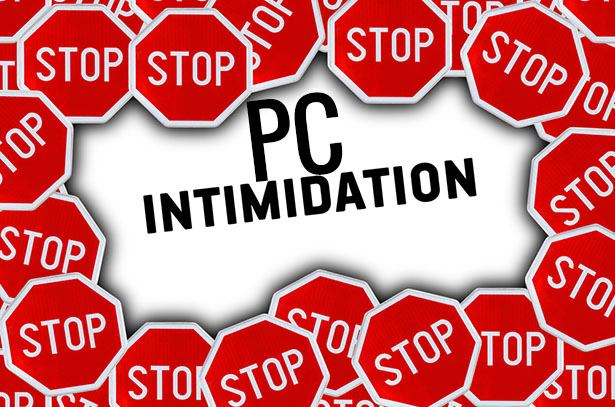
by Lil Tuttle
Do you feel you can't say what you think? Or espouse ideas and positions that someone else doesn't agree with? If so, you're not alone. You're actually in the majority.
A recent Knight Foundation and Newseum Institute survey of college students, developed in partnership with Gallup, found that 54% felt "the climate on campus prevents some people from saying what they believe because others might find it offensive." That's the bad news.
The good news is that students "draw a distinction between speech that is politically offensive," writes Nick Anderson in the Washington Post, "and expressions that are slurs or promote racial stereotypes" [emphasis added].
-
Asked whether colleges should be allowed to restrict political views that are offensive or upsetting to certain groups, 72 percent said no. Seventy-six percent of white students and 59 percent of black students held this view.
-
Overall, 69 percent said colleges should be able to limit the use of slurs and other language that is intentionally offensive to certain groups. Seventy-nine percent of black students and 67 percent of white students endorsed this view.
It's a great distinction to make.
What's Really Behind Politically Correct Intimidation?
Many conservative students tells us they are often frustrated on campus and in classrooms because they feel they can't express their conservative ideas or promote conservative solutions to public policy issues without suffering either down-grading by liberal professors or attacks from peers.
Grade intimidation by professors is one thing – sometimes we do what we must to pass a course or to maintain a scholarship.
Political intimidation by peers is an entirely different situation, and one we shouldn't tolerate because it won't end when we graduate.
In Political Correctness is War by Other Means, Angelo M. Codevilla explains why people attack others for disagreeing over ideology. It's not to persuade others to their point of view. Rather, PC intimidation is practiced solely to make the attackers feel good about themselves.
The answer is one of mankind's oldest stories. Confessing other people's sins (real or imagined) and inflicting punishment on them has ever been human beings' preferred path to feeling good about themselves. The more fault I find and the more penance I impose on thee, the holier I am than thou. The worse you are, the better I am and the more power I should have over you.
Because feeling better about one's self by denigrating and punishing others is an addictive pleasure the appetite for which grows with each satisfaction, victories can never satiate those who wage identity politics as war. The insatiability of their need to bolster self-esteem at others' expense is the reason why our rulers must trump every imposition with another, without end.
It is why satisfying any of political correctnesses' demands only generates more. Finding or manufacturing new ones is cheap and fun.
Allowing PC intimidation by peers to go unchecked or unchallenged is an invitation to more of it.
Only by exercising the courage of our convictions and speaking out clearly are we likely to defeat it and its manipulative power over us.
And if that sends the attackers scurrying to their safe spaces, we shouldn't feel badly about it at all.
____________
Sources:
Free Speech on Campus, Knight Foundation
Survey: College Students Seek Balance on Free Speech and Hate Speech, Nick Anderson, Washington Post
Political Correctness is War by Other Means, Angelo M. Codevilla, thefederalist.com

